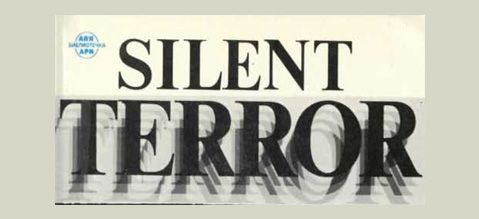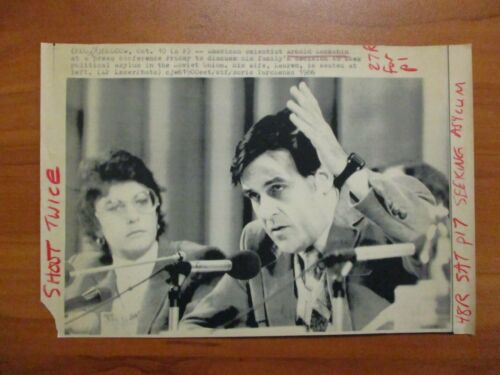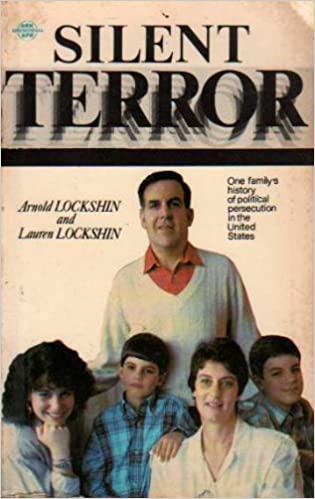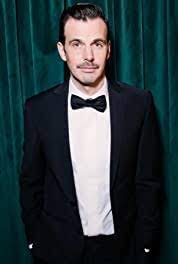The Lockshin Conundrum
In 1986, a Houston scientist and his family defected to the Soviet Union. Today, his son is a director of Super Bowl beer commercials and blockbuster romances.

Forgive the Robert Ludlum-type headline, but minus a few dead bodies, a femme fatale or two, and a plot to destroy the planet, this story qualifies….
One Sunday in October 1986, Arnold Lockshin, a recently fired cancer researcher at St Joseph hospital’s Stehlin Foundation, apparently got the communiqué from the Kremlin he had been waiting for.
He calmly wheeled the garbage from his carport and left it on the curb for Monday pick-up at his Meyerland-area home and told his wife and three kids to pack their bags. He and wife Lauren and their three kids piled in the family Chevy, leaving behind most of their possessions, and headed out to Intercontinental, where, traveling under assumed names, they caught a plane to Washington D.C., where they connected to Moscow, the family’s new home.

In a throwback to the often naïve idealism of the 1960s, Arnold Lockshin, a successful private citizen and not a spy in hot water, defected to the Soviet Union.
Coming practically on the eve of the Reagan-Gorbachev Reykjavik summit, the Soviets wasted no time in milking the Lockshins on the world stage for all they were worth. Soviet foreign minister Eduard Shevardnadze spoke glowingly of Lockshin, the brave American dissident who no longer wished to cast his lot with Reagan’s crass, capitalistic America.
Lockshin himself went on Moscow radio and told TASS that he had been fired from the Stehlin Foundation for his socialist, if not communist, views. (The Stehlin Foundation claim it was that the quality of his work had deteriorated.) Lockshin also stated that he was being harassed by shadowy government operatives – spooks were tapping his phone, opening his mail and threatening his wife. Even his kids’ classmates had been enlisted, he said; apparently his children were being unmercifully teased. (The Feds denied the charges; I never saw a confirmation or a denial from the kids at the Lockshins’ schools.) Bourgeois American capitalism was ritually condemned, by both the Lockshins and their new Soviet friends.
Back home, the Chronicle was not amused. In the first of two editorials, the paper slammed his decision thusly: “If Arnold Lockshin prefers Moscow to Houston, we are pleased that he is in Moscow.
Arnold Lockshin will soon enough learn his mistake, and what he has done to his wife and his three children.”
But Lockshin was hailed as a heroic dissident in Moscow. The doctor and his family were given a lavish-by-Soviet-standards furnished apartment in a neighborhood then called Lenin Hills. Lockshin was also given a job at the All-Union Cancer Research Center similar to the one he had held here.
A year later, they went to dinner with a reporter from the Ft. Worth Star-Telegram, and Lockshin and his wife Lauren told the scribe that they were content in Moscow. "We're happy and our kids are happy," Dr. Lockshin said. "The average [Soviet] working person is no different than the average working person in America. They have families, they watch television, they go to work. It's not like moving to another planet."
All they missed from America were Mary Tyler Moore re-runs and country songs such as George Strait’s “Does Ft. Worth Ever Cross Your Mind?”
Eventually, as the Cold War fizzled with a resounding whimper in from 1989 to 1991, Lockshin and his family were all but forgotten. Their tell-all book about their odyssey attracted little notice, save to publicize their claim that the FBI killed Martin Luther King. (Perhaps that was a more controversial claim then than now.) An appearance on the Phil Donahue Show — on the white-haired Irishman’s Russia tour — likewise failed to galvanize the proletariat here. As the Yeltsin years dragged on, they were slowly forgotten.
One who remembered them was Texas Monthly reporter Jan Jarboe Russell, who traveled to Moscow to attempt an interview in 1992, only to be rebuffed repeatedly by Dr Lockshin’s surly receptionist. On her last day there, she finally got through on the phone and found Dr, Lockshin to be as full of conspiracy theories as ever.
“The view of the world that he holds on to is not only irrelevant but banal,” she wrote. “Lockshin is a Cold War leftover. He may have imagined himself as heroic and romantic, but as the events of 1989 in Eastern Europe and 1991 in the Soviet Union prove, there is no heroism, no force left in Marxist rhetoric. The Cold War is not something that ended just in Eastern Europe. It ended everywhere. Americans who cling to Lockshin’s ideals are just as obsolete as Russians who cling to the tenets of Marxism.”
And that was that. Arnold Lockshin seems to have faded utterly into history, a weird footnote to a very weird era.

But I always wondered what happened to the Lockshin children. At the time of the family’s defection, Jennifer, the oldest child, was 15 and a student at Bellaire High. Jeffrey, their oldest son, was 11, and their youngest was a five-year-old boy named Michael. (I was a year older than Jennifer, and frankly, a bit of a Commie at the time, so their story resonated with me deeply.)
How do you first make the adjustment from Reagan’s America to Gorbachev’s Soviet Union, from Meyerland to the Lenin Hills, and then re-shift to the free-wheeling Russia of Yeltsin and whatever Russia it is that Putin is running?
Through the power of Google, I was able to sniff out some tantalizing leads.
A Jennifer Lockshin teaches English as a second language at Moscow’s State University Higher School of Economics.
A Jeffrey Lockshin teaches English at the same institution and also, if my reading of the Cyrillic script is correct, was, about five years ago, a candidate for a professorship of mathematics. (He also designs problems for something like the spelling bee of numbers -- the international Math Olympiad -- and used to frequent math newsgroups.)
Michael proved harder to find. A different Michael Lockshin is a celebrated rheumatologist and author based on the East Coast. I sifted out thousands of pages about this Lockshin and eventually found a few promising nuggets.
That two of the Lockshin children became mathematicians and English teachers was no surprise, but I was honestly astonished when I found the guy I believe to be the right Micahel Lockshin. For lo and behold, it appears that the baby of the Lockshin family is now, of all things, a music/pop culture critic and film-maker.
In 2002, in an apparently defunct English-language Russian publication called Lifestyle, a Michael Lockshin penned a preview of the Krylya Rock Fest, starring Russian rock icons Zdob Si Zdub, Multfilmy, Smysloviye Gallyutsinatsii and “the legendary Boris Grebenshchikov.” (Not to mention Iggy Pop on a rare jaunt to Russia.)
There’s another Michael Lockshin article from around the same time that appeared in the Russia Journal. This one was a review of two Skatalites shows. As he discussed the impact of the Jamaican ska pioneers on two divergent Moscow audiences, one nouveau-riche, the other apparently less well-heeled, he showed that the (very red) apple did not fall from the tree.
“The first concert at Restavratsiya, a club geared to the nouveaux riches, was reminiscent of a scene from the America of the 1920s, with poor black jazzmen playing their ‘wild’ music for the prosperous, extravagant white upper classes. Most people were eating and conversing, while a few bopped their heads occasionally. A dozen people, dancing by the stage, embraced the music's sunny essence, but they were in the minority.
In contrast, a crowd of close to 2,000 at Gorbushka (DK Gorbunova) was completely tuned into the groups ‘positive vibrations.’ Jumping, smiling and joking, people in the audience formed Conga lines, learned how to pronounce the exclamation ‘Awwllrrrright!!’ and sung along for more than two hours with Doreen Shaffer, the old-time jazz singer touring with the group.”
In another article, a Michael Lockshin was described as a filmmaker who curated a festival of short films in Moscow and divided his time between that city and London.
So it appears that the Lockshin children avoided the gulag, at the very least. Maybe, just that one time, the Chronicle’s editorial board was a little too tough on the Russkies.
A few of their old friends wrote in to comment on my article.
I remember Arnold Lockshin differently than any opinion above or in the newspapers,” wrote “I remember.” This person claimed to have been friends with the elder Lockshin from junior high through HS.
“I can still see his smile with his braces on his teeth, he, or she, wrote, adding that he was a very talented pianist who was asked to solo with the San Francisco Symphony on occasion.
“He had a keen sense of humor. He was sensitive to others. He was extremely intelligent,” the correspondent went on.
“The last time I saw him was in his mother's restaurant. I had my two young daughters with me. He was still at the university, working on the newspaper. I had recently graduated from an out of state university. We had a nice visit.
It was shocking to see him on TV announcing his defection, “I remember” wrote.
“He is not a person to become delusional! If he said he was happy and his kids were happy, I believe him. He was also a capable person who put himself totally into his "work", music or otherwise. He thought people were following him because of his socialist leanings. They probably were. I have no confirmation of such. Whatever our philosophical differences, I am his friend and will remain so. He had roots in Russia, and had been there before, professionally. His two older children seem to be happy teaching. Music is applied mathematics. His youngest son, Michael, seems the most like Arnold, and probably most fulfilled. He seems to have Arnold's creativity, sense of fun and humor, and drive to move where his spirit leads him. To you, Arnie Lockshin, wherever you are.”
A classmate of one of the Lockshin children directly disputed Arnold’s claim that they were bullied and others indirectly did so by saying they were popular. A Russian commenter said their teachers told the kids there to go out of their way to make the American kids feel at home, and they did so. “As I know they look and feel like a million dollars,” wrote “Alexander.”
A friend from his undergrad days says Lockshin’s anti-government, anti-Vietnam views were so strident that his defection came as no surprise, even if it came as the Cold War was winding down and US relations with Vietnam were warming up.
Since writing that article in 2008, on rare occasions I’ve received tips, some even coming from the Lockshin kids themselves. From Jennifer I’ve never heard a thing. In addition to popping up on Russian TV in 2013 to defend the defection of Edward Snowden, Arnold, the patriarch, send me a note somewhere along the way, excoriating the US government for denying him his social security. After all, he said, he’d paid in, and neither the Soviet Union nor Russia were at war with the US. Why was he not entitled to his American state pension just because he’d denounced the country forever? He did not reply to my excited response, nor did Michael, who sent me something of a teasing letter, reading something to the effect of “You found me, now catch me if you can.” It wasn’t malicious; just indicative of him not much caring about continuing the correspondence.
Perhaps because he was too busy becoming rich and famous. About two years ago Russian emigre to Holland informed me that Michael Lockshin had become one of the most favored and wealthy film directors in Russia.

Michael Lockshin - IMDb
By 2019, this person said, he’d been contracted to direct Budweiser’s Russian Super Bowl ad. Yeah, I didn’t know the Super Bowl was a big deal there either but apparently it’s big enough of one to where the ads, as here in the US, are events.
And so we have Lockshin’s ad, one that makes more use of the Clydesdales than any I’ve seen since I was a kid. Only these aren’t the gentle giants of my youth — the are screeching, tectonic-hoofed, behemoths stomping out “We Will Rock You” first in a steampunk studio and then on the periphery of the Kremlin to their rock n’ roll show….Apparently some version of rock and roll Americana has great appeal still in the streets of our once, future and forever enemy.
But that was most decidedly not all. Following the Bud ad coup, an oligarch tabbed Lockshin to direct The Silver Skates, a feature-length historical romance with a gargantuan budget by Russian standards. Based on the 19th century American novel Hans Brinker, or The Silver Skates by Mary Mapes Dodge, the film’s theatrical release was enveloped by the early covid pandemic; nevertheless, according to sources I am sure are unimpeachable, it has managed to recoup 98 percent of its 500 million ruble ($6.5m) budget.
The novel that inspired it was set in Holland and was quite successful in post-Civil War America, where it introduced the sport of speed skating to those parts of America where it was frigid enough to partake, and also, to the story of the little boy who stuck his finger in the leaking dike and thereby saved Holland. A side story in the novel, it is by now all of what all but doctoral students of popular 19th Century American lit know of this novel. Or even that it came from a novel….I thought it just sort of had been floating around out there in the air like a Mother Goose story.
Anyway…the Russians move the action to 1899 St. Petersburg where the speed-skating hero — Matvey, a courier for a baker — is in romantic pursuit of a young woman above his station — the daughter of a tsarist minister with a burning passion for chemistry. Her father, in turn, scorns her desire to become a scientist, almost as much as her love for the illiterate Matvey. It is Big Daddy’s plan for his little darling Alisa not to trouble her pretty little head with the periodic table; instead she is to be forced to marry a rich prince she disdains.
And then things happen on the way to Paris….
Per Wikipedia, everyone in Russia loved it. Everyone. Or at least everyone with a platform:
The film received high marks in the Russian press; according to aggregators, there were no negative reviews at all. "The full-length debut of director Michael Lockshin was definitely a success," Valery Kichin writes in Russian Gazette.[42] Many of the critics have highlighted the vintage aesthetics, the film's dreamlike atmosphere and music. Anton Dolin in Meduza also noted the social subtext of the plot: "The central conflict of the Silver Skates - it seems for the first time in the domestic film mainstream - is associated with the liberation of the heroine from the bonds of patriarchy."[43] Some authors have compared The Silver Skates to Titanic (1997 film), noting plot parallels.
The Western press has not been so kind. One reviewer called it "at best an empty, escapist, mostly guilty near-pleasure” and it scores a 33 percent on Rotten Tomatoes.
But hey, you can judge for yourself: it’s on Netflix here.
Or, the trailer, if you prefer:
As much as I wanted to continue my correspondence with my Facebook informant, it soon became apparent that she was a hardcore member of the European far-right. She was lecturing me on how I should not believe my lying eyes and instead trust those who blamed Antifa for all that ailed America. (This was amid the George Floyd protests but before January 6.) I could see I was dealing with a zealot and blocked the correspondent because our conversations had devolved into nothing more than me telling her that she was brainwashed, that I lived here, and that until she came here and saw for herself that Antifa did not Rule the Night in all American Cities she had not a single clue what she was talking about, and her saying the opposite to me.
But I am grateful to her for catching me up on Michael Lockshin, Houston’s greatest director of Russian blockbusters and Super Bowl beer commercials.
As for his thoughts on the current war in Ukraine, I have absolutely no doubt what old Arnold Lockshin would be thinking: he would 100 percent be in favor of probably reabsorbing it into Russia as perhaps a semi-autonomous region if not simply the equivalent of a state. Such has been the view of all patriotic Russians be they Red of White — going back to the days of the Mongol Horde, they have a well-founded fear of ground invasions, one that has been reiterated if less successfully by Hitler and Napoleon. Time has softened their fears of eastern invasions, though they did set up Mongolia as a puppet state as a buffer against both China and Japan, but those once-a-century invasions by current EU powers have hardened their view to the west.
A cynic might say the Russians want the Ukraine as only a speed-bump but they really do view it as much more than that. Kyiv is the birthplace of their civilization, the original capital. In Texan terms, it is the Washington-on-the-Brazos; perhaps for Americans something more like Plymouth Rock or Jamestown.
So the best analogy I can think of for Americans is this near-future sci-fi one: say 25 or 50 years down the road, Texas does secede, but by then the state is 75 percent Hispanic. This new free Texas republic promptly shifts its allegiance from Washington to Mexico City — to Russians, this is roughly akin to the Ukrainian desire to shift away from Moscow to Brussels. There would be protestors within Nuevo Tejas and perhaps even breakaway zones as we’ve seen in the Ukraine, and Washington would encourage as much dissent and strife as possible, up to and including invasion. As obnoxious as we can be to most of the rest of America, I cannot help but think that our absence would be noted and forbidden to stand.
But who knows? Maybe Arnold’s son will give us the Lockshin family view on the war through his camera’s eye.
